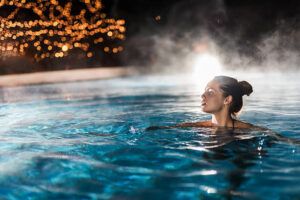10 reason why swimming in the night is not advisable to take act

Swimming at night may seem appealing, but it can present several risks that make it generally inadvisable. Here are 10 reasons why:
1. Limited Visibility: It’s harder to see underwater hazards, other swimmers, or obstacles, increasing the risk of accidents.
2. Difficult Rescue: Lifeguards or other swimmers may not easily spot someone in trouble, delaying rescue efforts.
3. Cooler Water Temperatures: Water can get much colder at night, increasing the risk of hypothermia.
4. Reduced Sense of Danger: In the dark, it’s harder to judge wave sizes, water depth, or currents, which can be more dangerous than they appear.
5. Wildlife Activity: Some marine animals or insects are more active at night, which could increase the risk of bites, stings, or other unpleasant encounters.
6. Increased Risk of Getting Lost: Poor visibility makes it difficult to navigate, especially in large bodies of water where there are few landmarks to guide you back.
7. Higher Risk of Crime: Swimming at night can leave you vulnerable to theft or attacks if you’re in an isolated or poorly lit area.
8. Unexpected Changes in Water Condition: At night, sudden shifts in currents, tides, or weather can go unnoticed, making the water dangerous.
9. Lack of Supervision: Night swimming often happens in areas without lifeguards or proper supervision, which increases the risks of accidents or injuries.
10. Fatigue and Disorientation: If you’ve had a long day, swimming at night can increase the likelihood of exhaustion or disorientation, which can be dangerous in the water.
Leave a Reply